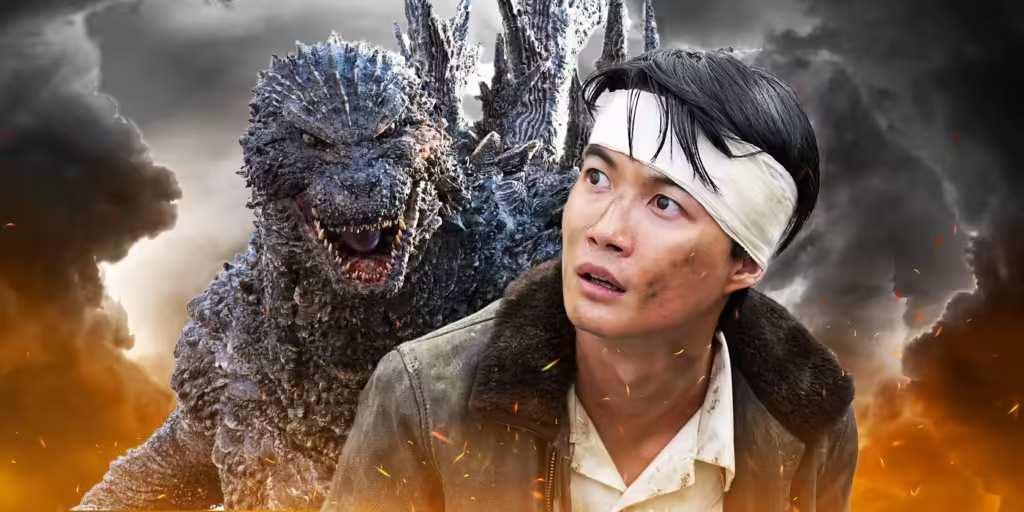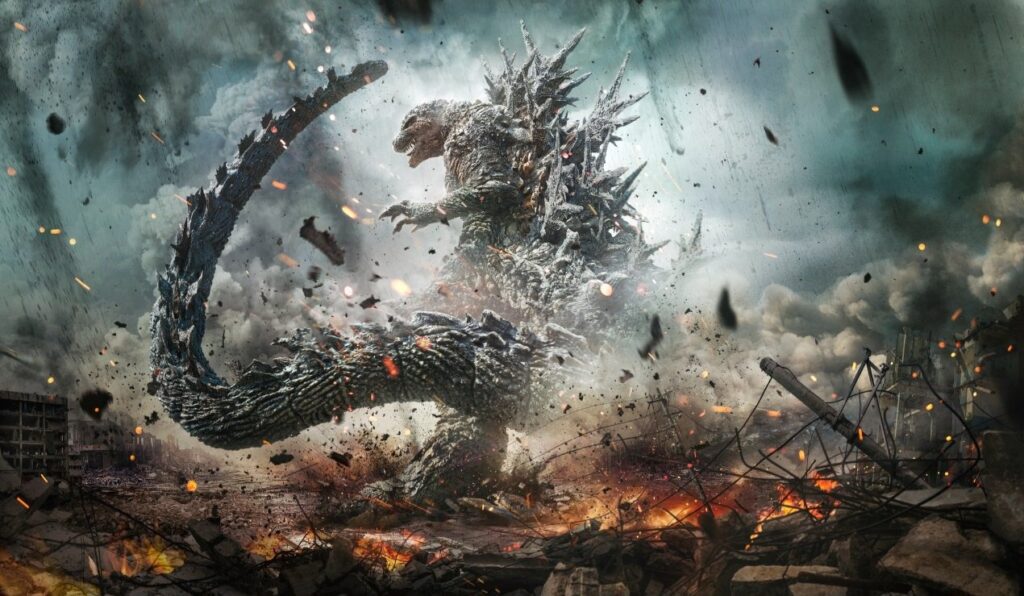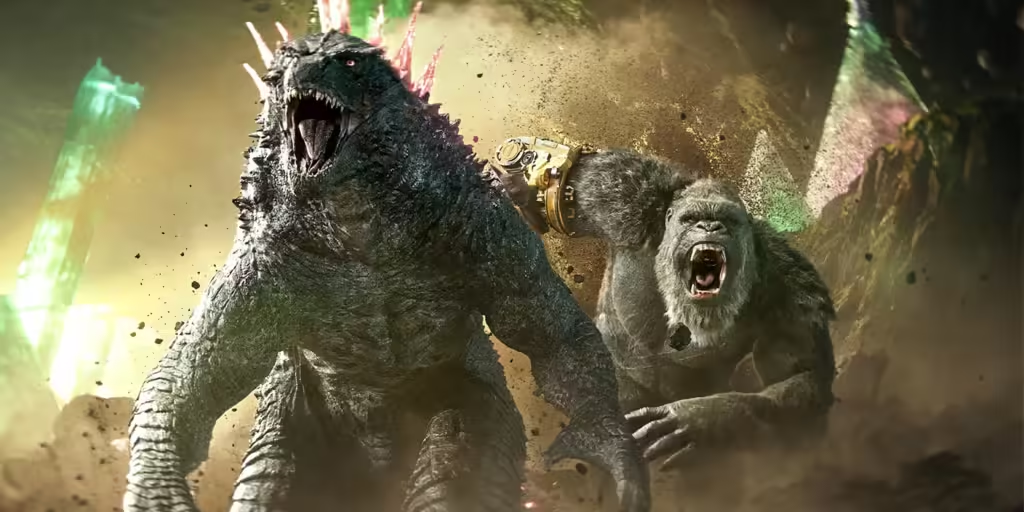The release of Godzilla Minus One has sparked intense discussions across the globe, with fans and critics alike sharing their thoughts on the latest addition to the legendary Godzilla franchise. With every new Godzilla film, there’s always a blend of excitement and anticipation. However, with Godzilla Minus One, the buzz feels even more electrifying. But what exactly are the Godzilla Minus One reviews saying, and why has this installment garnered so much attention?
Godzilla Minus One: A New Direction for the Franchise?
In Godzilla Minus One, the iconic kaiju returns to Japan in a post-war setting, but this time, the destruction he brings is more personal and symbolic. Set in the aftermath of World War II, the movie explores not just the physical devastation Godzilla causes, but also the psychological and societal aftermath of war. This nuanced approach has left audiences both moved and in awe, which is evident in many of the Godzilla Minus One reviews circulating online.
Critics are praising the film for:
- Emotional Depth: Unlike some of the previous Godzilla films that focused solely on action and destruction, Godzilla Minus One delves into the emotional toll of both war and Godzilla’s wrath.
- Stunning Visuals: The cinematography and special effects have been applauded for capturing the raw power and presence of Godzilla in ways that feel more intense than ever.
- Unique Storytelling: The film’s choice to set Godzilla’s return in a war-torn Japan adds layers of meaning, resonating deeply with both Japanese and international audiences.
What Are Critics Saying About Godzilla Minus One?

When it comes to Godzilla Minus One reviews, critics have been largely positive, with many calling it one of the best films in the franchise. The movie has been described as a powerful blend of action, emotion, and cultural commentary, which is not always easy to achieve in a monster movie.
One of the standout elements in the Godzilla Minus One reviews is the balance between spectacle and storytelling. While fans of Godzilla expect epic battle scenes, this movie goes beyond mere action. By focusing on the human experience in a post-war Japan, Godzilla Minus One gives the audience a fresh perspective on the Godzilla mythos.
Highlights from Critics:
- Emotional Impact: Many critics have noted that Godzilla Minus One stands out for its ability to tug at the heartstrings. The film’s focus on post-war trauma and personal loss has elevated it above previous entries in the series.
- Character Development: Unlike some monster films that sideline human characters in favor of action, this movie gives ample screen time to the people affected by Godzilla, making their struggles more relatable.
- Pacing and Suspense: The film builds tension masterfully, with the looming presence of Godzilla always felt, even when he isn’t on screen.
Audience Reactions to Godzilla Minus One

As expected, fan reactions in Godzilla Minus One reviews have been just as enthusiastic as those from critics. Many long-time fans of the franchise have expressed their appreciation for the fresh take on Godzilla’s return, while newer audiences have been captivated by the film’s emotional depth.
Key Themes in Audience Reviews:
- Nostalgia Meets Innovation: For many fans, Godzilla Minus One strikes the perfect balance between paying homage to classic Godzilla films and introducing innovative storytelling techniques.
- Visual Effects: The seamless blending of practical and CGI effects has been a hit with viewers, making Godzilla’s destruction feel all the more real and terrifying.
- Relatability: Audiences have found themselves unexpectedly connected to the human characters, whose struggles mirror real-world issues of recovery, loss, and hope.
Visual Mastery: A Closer Look at the Cinematography

One of the most frequent points of praise in the Godzilla Minus One reviews is the visual mastery of the film. The depiction of post-war Japan, combined with the sheer scale of Godzilla, creates an atmosphere of dread and awe. The special effects team has outdone themselves, particularly in scenes where Godzilla’s destructive force is unleashed.
The attention to detail in recreating a war-torn Japan has been especially noted. From crumbling buildings to desolate landscapes, the setting plays as much of a role in the movie as the titular monster. Fans have commended the film for staying true to the darker, more atmospheric tone of earlier Godzilla films.
Godzilla Minus One: What Sets It Apart?
As many Godzilla Minus One reviews have pointed out, the film sets itself apart by blending monster movie thrills with historical and emotional weight. This is not just another action-packed kaiju movie; it’s a thoughtful exploration of the human condition in the wake of unimaginable destruction.
Moreover, Godzilla Minus One adds new depth to the character of Godzilla himself. In this film, Godzilla is not just a monster rampaging through cities—he becomes a symbol of past trauma that refuses to fade away. This metaphorical layer has resonated with many viewers, adding to the film’s critical success.
FAQs
What makes Godzilla Minus One different from previous Godzilla films?
Unlike many of the earlier films in the franchise, Godzilla Minus One delves into the emotional and psychological aftermath of destruction, focusing on post-war Japan and the personal toll it takes on its characters.
Is Godzilla Minus One more emotional than other entries in the franchise?
Yes, many Godzilla Minus One reviews highlight the emotional depth of the film, with a particular focus on the human cost of Godzilla’s destruction and the lingering trauma of war.
How are the visual effects in Godzilla Minus One?
The visual effects have been widely praised in both fan and critic reviews. The combination of practical effects and CGI creates a stunningly realistic portrayal of Godzilla’s destructive power.
Does Godzilla Minus One cater to long-time fans of the franchise?
Absolutely! While it introduces new elements, it also pays homage to the classic Godzilla films, making it a hit among both long-time fans and newcomers.
What is the general critical reception of Godzilla Minus One?
The movie has been met with overwhelmingly positive reviews from both fans and critics, with many calling it one of the best Godzilla films to date due to its emotional depth and powerful visuals.
Is Godzilla Minus One worth watching if I’m not a big Godzilla fan?
Definitely. Even if you’re not familiar with the franchise, the film’s powerful storytelling and emotional impact make it a compelling watch for any moviegoer.
Is Godzilla Minus One good or bad?
Godzilla Minus One has been widely regarded as a great film, receiving overwhelmingly positive reviews from both critics and audiences. The film is praised for its emotional depth, stunning visuals, and unique approach to storytelling within the Godzilla franchise. It combines the spectacle of kaiju action with powerful human drama, making it a standout entry. While individual opinions may vary, the general consensus is that Godzilla Minus One is a strong, well-executed movie.
Is Godzilla Minus One a reboot?
Godzilla Minus One is not exactly a reboot in the traditional sense. It is part of the broader Toho Godzilla universe but introduces a fresh narrative and a standalone storyline that differs from previous films. Set in a post-World War II Japan, it explores Godzilla’s destruction in a new historical context. While it doesn’t erase past films or reset the entire franchise, it offers a new perspective and can be seen as a soft reboot or reinterpretation of Godzilla’s origins and impact.
Is Godzilla Minus One about PTSD?
Yes, Godzilla Minus One incorporates themes of PTSD, particularly as it relates to the survivors of World War II in Japan. The film explores the psychological aftermath of war and devastation, not just through the destruction caused by Godzilla, but also by showing how the characters are affected by past trauma. The fear and emotional scars left by both the war and Godzilla’s presence are central to the movie’s plot, making it a poignant reflection on human suffering and resilience.
Is Godzilla Minus One gorey?
Godzilla Minus One contains intense action sequences and scenes of destruction, but it is not excessively gory. While there are moments of violence and disaster that may be unsettling, the film focuses more on emotional tension and spectacle rather than graphic violence. Most of the destruction caused by Godzilla is shown through large-scale devastation, with minimal focus on blood or gore.
Why is Godzilla Minus One so cheap?
Despite its lower budget compared to Hollywood blockbusters, Godzilla Minus One has managed to achieve high production values through effective use of practical effects, smart visual design, and efficient CGI. Japanese studios like Toho have a tradition of making impactful Godzilla films on smaller budgets by focusing on storytelling, strong direction, and selective use of special effects. The film’s modest budget likely stems from this resourceful approach, while still delivering a visually impressive experience.
Why is Minus One so good?
Godzilla Minus One has been praised for its emotional storytelling, innovative direction, and powerful use of symbolism. Its ability to blend action-packed monster scenes with meaningful character arcs has resonated with viewers. The film’s setting in post-war Japan adds historical depth, while its focus on human trauma and resilience makes it more than just a typical kaiju film. The combination of these elements, along with stunning visuals, has made it a critical success.
Is Godzilla still alive in Minus One?
Without giving too much away, Godzilla Minus One depicts Godzilla as a relentless force of destruction, and his fate is a key part of the film’s dramatic tension. As in many Godzilla films, the creature is portrayed as nearly indestructible, symbolizing a constant, looming threat. Whether or not Godzilla survives by the end of the film is something that keeps audiences engaged and on edge.
Is Godzilla Minus One Oscar worthy?
While it’s unusual for kaiju films to receive significant attention during the Oscar season, Godzilla Minus One has qualities that could make it a contender in certain categories, particularly in visual effects, sound design, and perhaps even international film. Its unique blend of emotional storytelling and technical achievements might draw interest from critics, but whether it will garner Oscar attention remains to be seen.
Why is Godzilla Minus One evil?
In Godzilla Minus One, Godzilla is portrayed as a devastating and unstoppable force, embodying destruction rather than traditional evil. His actions, while terrifying and destructive, are more symbolic of nature’s uncontrollable fury rather than being driven by malice. The film uses Godzilla as a metaphor for the lingering effects of war and trauma, which can feel “evil” to those affected, but it’s more about the uncontrollable force that brings devastation.
Why was Godzilla Minus One so angry?
Godzilla in Godzilla Minus One appears as an embodiment of destruction and devastation, especially in the context of post-World War II Japan. His “anger” can be interpreted as a reflection of nature’s wrath or the consequences of human conflict and war. The film does not provide a clear reason for Godzilla’s behavior, but his relentless attack on humanity can be seen as a metaphor for the aftermath of war, where the destruction continues long after the fighting has stopped.
Is Godzilla Minus One a guy in a suit?
Godzilla Minus One primarily uses CGI for Godzilla’s appearance, rather than the traditional “man-in-a-suit” technique used in older films. However, Toho Studios, known for their practical effects work, may incorporate elements of physical props or motion capture to enhance the realism of Godzilla’s movements. The film successfully combines modern technology with the franchise’s classic approach to kaiju filmmaking.
Is Godzilla Minus One about WWII?
Yes, Godzilla Minus One is set in a post-World War II Japan and deals with the aftermath of the war. The devastation of the country, both physically and emotionally, is a central theme, and Godzilla’s arrival further complicates this recovery. The film draws clear parallels between the destruction caused by the war and the destruction brought by Godzilla, using the kaiju as a metaphor for the lingering trauma of conflict.
In summary, Godzilla Minus One has not only lived up to the expectations of long-time fans but also exceeded them by delivering a film that combines thrilling kaiju action with deep emotional resonance. The overwhelmingly positive Godzilla Minus One reviews reflect the film’s ability to stand out in a crowded franchise, offering a fresh and engaging take on the Godzilla mythos. Whether you’re a fan of giant monsters or simply appreciate good storytelling, this is one movie that shouldn’t be missed.
For anyone curious about what makes Godzilla Minus One so special, the reviews speak for themselves: this is a Godzilla film with heart, depth, and enough spectacle to leave you on the edge of your seat.
To read the latest articles please visit the home page of Turk Blogs.





